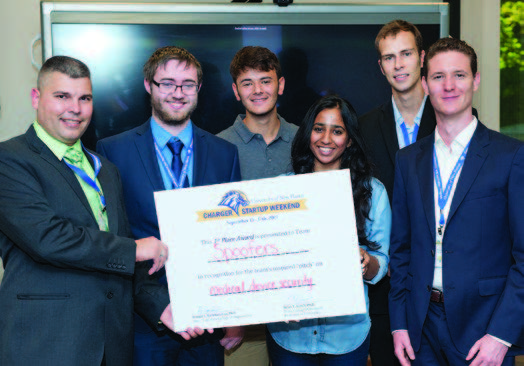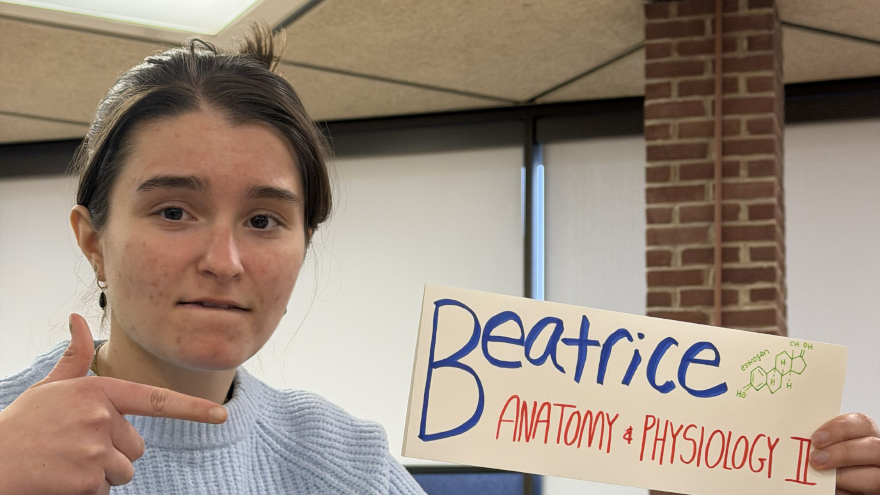May 8, 2018
By Jackie Hennessey, contributing writer

On any given morning, you might decide to start the coffeemaker from another room, turn the heat down in the house from three cities away, or have the GPS find a way to navigate around a sudden, snarling traffic jam, all thanks to the connected nature of the Internet of Things.
But a team of University students — Max Theokritoff ’22 M.S., Tejna Nagaraj ’21 M.S., Jonathan Ramirez ‘18, Benjamin Miles ‘18, Benjamin Klemme ‘20, and John Bobish ‘20 — who won last fall’s Charger Startup Weekend Competition organized by the Entrepreneurship and Innovation Program — warn that ease can come at a cost.
"Consider all the millions of medical devices that rely on Bluetooth for connectivity," Theokritoff said. "You could be sitting in Starbucks, accessing their Wi-Fi and detect all the Bluetooth devices nearby. With no authorization needed, you could connect to a device," Nagaraj said. "Some of those could be smartphones, but others could be pacemakers or another medical device," she said.
"Or you could go to a hospital and the nurse could place a pulse oximeter on your finger to check your blood oxygen level. And it’s wireless. So that device is connected to many other devices in the hospital. What if someone wanted to intercept that, to hack in and use that way in to get at patient data? There is the chance people could do something malicious to people’s medical devices." Jonathan Ramirez
So the team set out to essentially build a wall to keep hackers from penetrating medical devices.
Their solution? Apply authentication, identification, and data protection cryptography to life critical/connected medical devices to defend against hackers. "Implanted medical devices rely on Bluetooth or other connectivity standards to provide better healthcare to patients," Theokritoff said. "Unfortunately, connectivity security is limited on these devices as they are small. We’re working on low energy technology to drastically improve implanted medical device security."
Ramirez said they are using existing SecureRF Technology to build their solution, "adapting existing cryptographic solutions to our customers’ products to prevent malicious activities."
The possibilities seem limitless, they said, because the medical device industry is a multibillion dollar industry that is expected to grow at a rate of five percent a year. According to their research, Bluetooth device sales are growing at 8.9 percent annually. Medical tech sales are expected to grow 5.2 percent over the next few years, from $371 billion in 2015 to $529 billion in 2022.
They arrived at the Startup competition, each with their own idea to pitch, but once the top ideas were voted on, they chose this one. They were a group of students with an array of talents, interests, and academic backgrounds who were suddenly a team. Theokritoff is a graduate of the IÉSEG School of Management in France, pursuing a master’s in Computer Science. Nagaraj, Ramirez, and Klemme are electrical engineering majors; Miles is a marketing major, and Bobish is studying accounting. Students from universities throughout the region took part, and faculty members and entrepreneurs from the region’s start-up community mentored the teams.
In the high stakes, pressure cooker whirl of the Startup weekend, where day turns into night and day again, and the collaborative work rolls on, they found they worked really well together. "We all shared a passion about this idea; we knew how important it could be to people, and we wanted to make it happen," Theokritoff said.
For 45-plus hours, they worked together on their idea and, in the end, they won.
"It was so exciting to win. The best part of this experience is working toward a solution which would benefit a lot of people in the future." Tejna Nagaraj
Theokritoff said having the chance to create the team they did, to network, to gain a professional mentor, to develop all the soft skills needed to create a business, and to go on to work to develop that business — were the big wins.
In November, they presented their project to the Tagliatela College of Engineering Advisory Board. Dean Ron Harichandran said buzz continues to build about their idea. This spring, they will enter the Consortium of Entrepreneurship Educators’ Connecticut Business Plan Competition.
Work continues on their product. "The licensing agreement with Secure RF, which would enable us to use recognized industry technology to build our solution, has been approved, and all that is left is the signing," Theokritoff said. They are building the infrastructure needed to manage the use of cryptography in the products, developing consulting, testing, and training services and fine- tuning their business plan.
"I love working on this; we all do," Ramirez said. "We think it can make a big impact on people’s lives."



